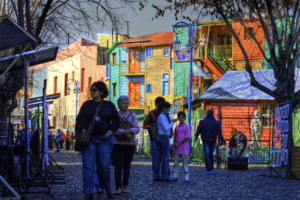The Response to COVID-19 in Argentina

As governments all over the world scramble to contain the spread of COVID-19, Argentina’s response has been especially quick and comprehensive. The South American country confirmed its first case on March 3, 2020. Since then, the government has adopted a response plan consisting of strict shelter-in-place orders and travel bans, as well as extensive economic relief. These policies have allowed the administration, led by President Alberto Fernández, to limit both the medical and economic consequences of the pandemic. To date, over 6,000 confirmed cases of COVID-19 in Argentina and over 300 deaths have occurred. These numbers are better than those of comparable countries that had slower or less extensive responses to the virus.
Shelter-in-Place Policy
The Argentine government’s country-wide shelter-in-place policy went into effect 17 days after its first confirmed case. Citizens can only travel to their nearest supermarket or other essential business and otherwise have to stay home. The police are strictly enforcing this national shutdown of non-essential activity. The government emphasizes that social distancing is the most effective way to combat the spread of COVID-19 in Argentina, as the country does not have the resources to do universal testing. Violators of the shelter-in-place order can face jail time. The police began making arrests on the first day the policy officially went into effect.
Argentina has also enacted a travel ban that is among the strictest in the world. The country’s borders have closed to all inbound and outbound travel since March 2020. In late April 2020, the government adopted a policy banning all airline travel into, out of and within the country until the beginning of September 2020. Several South American countries have instituted similar flight bans, but Argentina’s ban will last longer than any of the others. The intention of these policies is to halt the potential spread of COVID-19 in Argentina by limiting people’s travel capabilities. However, many expect that the flight ban will be a significant burden on Argentinian airlines and airports.
Economic Relief
Before the pandemic, the economy of Argentina was in a recession; approximately 40% of people were living below the poverty line. The current administration inherited over $300 billion in debt when it came to power in 2019. To relieve the huge economic pressure that COVID-19 in Argentina caused, and to prevent the country’s economy from falling deeper into recession, the government has instituted multiple economic relief programs. The President issued an emergency decree banning all worker layoffs for two months. This measure should protect Argentina from the huge spikes in unemployment that other countries are experiencing due to the economic slowdown. The expectation is that business leaders will take a financial hit instead of laying off more financially vulnerable workers.
The government has also begun several social welfare programs. The President issued an executive order so that companies do not cut essential services, such as electricity, water and cable television, for retirees or poor households due to lack of payment. Another executive order provides a 10,000 peso emergency family income for domestic and low-income workers. Initially, many citizens had to wait in lines for up to 12 hours to collect their payments. The government has since expedited this process by keeping bank branches open on weekends. In addition, the administration has suspended all evictions and rent hikes until the beginning of September 2020. These policies should ensure that the most vulnerable members of society can maintain their basic necessities as the economy struggles through the pandemic.
While all citizens are enduring the huge impact of COVID-19 in Argentina, these policies have helped move the country closer to being able to return to its normal way of life. Banning international travel and enforcing social distancing are both important methods for minimizing the spread of the virus. Broad economic relief programs have helped limit the damage to an economy that was already struggling. It is impossible to know how long this pandemic will last, so Argentina’s government has been quick and cautious with the policies it has instituted.
– Gabriel Guerin
Photo: Wikimedia
